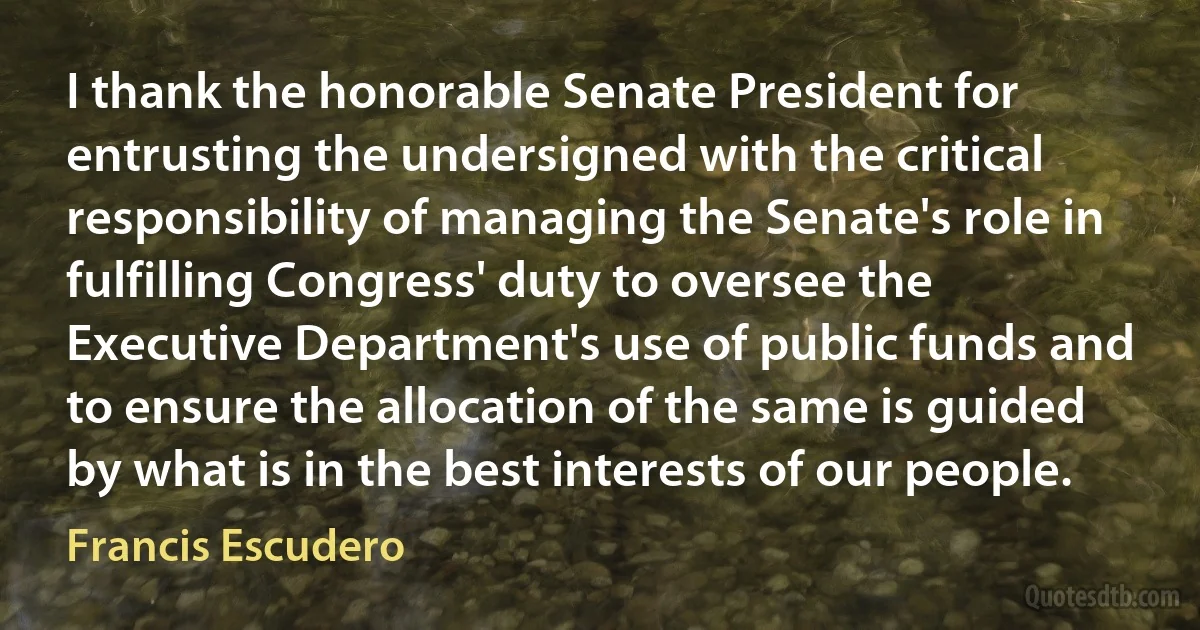Senate Quotes - page 18
I nonetheless reiterate my commitment, as a member of the majority bloc in the Senate, to exert efforts to ensure the timely passage of the GAB. I likewise pledge to play an active role in initiatives to put in place strong and categorical safeguards in the GAB to guarantee that it complies with the decision of the Supreme Court (i.e. Belgica v. Ochoa and Araullo v. Aquino) and that it will not be used as a tool for partisan political interests.

Francis Escudero
The Senate version of the 2015 National Budget will define savings in FULL COMPLIANCE WITH THE SUPREME COURT DECISION on the Priority Development Assistance Fund (PDAF) and the Disbursement Acceleration Program (DAP). Our committee accepted all of Senator Miriam Defensor Santiago's points and took note of her concerns. I believe Senator Santiago based her speech on the NEP version, NOT the one the Senate has amended. However, the Senate version is never going to adopt the version of the NEP as regard to their definition of savings.

Francis Escudero
Twenty-five years ago, I created the Taxpayer Protection Pledge at the federal level. Then I brought it to the state and local level. About 97 percent of the Republicans in the House and 85 percent in the Senate have signed on, and the number of candidates who have taken the pledge is even higher. It's become a party position.

Grover Norquist
Mr. President, before I conclude, I feel obliged to comment briefly on two amendments that I intend to offer, designed to assist U.S. citizens who have had their property confiscated--that is to say illegally stolen--by foreign governments receiving foreign aid from the taxpayers of the United States. The Senate passed one of these amendments 96 to 4. I stood down there during the vote and Senators came in and said, "good amendment" and all of the rest of it. The State Department, however, and other U.S. officials turned a deaf ear to U.S. citizens whose property had been unlawfully taken from them. Unfortunately, the Senate must again send a wakeup call to the U.S. State Department. That message must go to the countries abusing the rights of U.S. citizens, and those countries ought to be denied even one dime of foreign aid money until they cut this out.

Jesse Helms
The bipartisan spirit of McCain's long collaboration with Edward Kennedy and other Democratic senators is no surprise. McCain calls Kennedy "the lion of the Senate," as indeed Teddy is - perhaps our finest senator ever. Jack Kennedy, too, was bipartisan, appointing two Republicans to his cabinet. McCain, one of the two or three most bipartisan national figures of our day, has worked with Democrats on the environment, court appointments, campaign finance, immigration and more. Obama has the most extreme partisan voting record of any senator. Now, gambling his candidacy on a dynamic young Alaska governor, McCain has confirmed his independence as a leader not bound by the insider politics of Washington.

John McCain
It is my pleasure to join all of you today as we honor President Shimon Peres, one of the bravest and most principled political leaders of our time. I was honored to join with my colleagues in the Senate to pass legislation bestowing the congressional gold medal on this great man. I was not surprised when that legislation passed unanimously, and it my hope that our colleagues in the House will move forward with their own legislation soon. President Peres deserves this honor. The story of his life is entwined with the story of the birth and development of the State of Israel, and in him we see the essence of Israel itself--an invincible spirit that cannot be denied. Through his determination, his strength and perseverance, and his profound compassion, President Peres enabled a seemingly impossible dream to become a reality and changed forever the destiny of the Jewish people.

John McCain
Madam President, on Saturday evening, a great loss echoed throughout our country. Six decades of patriotic service came to an end. We have suspected for some time that we would bid farewell to our colleague, the senior Senator from Arizona, John McCain. John took full advantage of the months since his diagnosis. His hard work continued, but happy reminiscing, fond farewells, final reflections, and time with family actually came to the fore. I was privileged to spend a small share of that time with John. We sat on his back porch in Sedona under the desert sky, replaying old times. John did things his way these last months. For his colleagues here, the time confirmed a sad but obvious truth: The Senate won't be the same without John McCain. I think it is fair to say that the passion John brought to his work was unsurpassed in this body. In more than 30 years as a Senator, he never failed to marshal a razor-sharp wit, a big heart, and, of course, a fiery spirit.

John McCain
Senator Graham observed that John will not be replaced by any one Senator. It is going to take all of us working together. It is going to take all of us to really accomplish what John knew we were capable of. By coming together, respecting one another, one another's principles, even when we disagree, and working through these disagreements to compromise--that is how we really honor John's legacy. There are a lot of words, and these words will come and go, but the way to truly honor him is to live out what he believed this Senate is capable of doing. We were reminded that there is a little John McCain in all of us. I think it would be good for us to remind one another of that, to urge the inner John McCain in each of us to present itself in a way that betters our institution.

John McCain
For most of the time from his first election until his 2000 presidential campaign he was a reliable conservative Republican: pro-defense, anti-tax, anti-abortion, solid on social issues and the culture wars. But he was never a team player, never popular with his Republican colleagues, with whom he publicly quarreled on the slightest pretext, which made him seem more independent. It could just as easily be that he was more selfish. In high school, McCain's nicknames included "McNasty,” and for more than two decades, the overriding majority of his Senate colleagues, in both parties, have repaid his angry outbursts against them with active and unrelenting dislike.

John McCain
And then there was his complicated relationship with our state. John McCain lived in many places after Vietnam, but for the last 36 years he called Arizona home, and represented the state in Congress - from 1982 to 1986 as a representative, and then from ‘86 to his death as a member of the United States Senate. McCain embraced Arizona, adopting the pretty landscape of central Phoenix and Cornville, posting photos of red-rock hikes, but doing very little during his tenure to support the state. In fact, his stand against "pork-barrel politics” at a time when his colleagues in Congress were busy lining their own states' pockets with infrastructure cost Arizona dearly while increasing McCain's popularity as a refreshingly honest leader who turned down handouts. In a lot of ways, it didn't matter what state he lived in. John McCain was America's senator, not Arizona's, a transplant (or a carpetbagger - again, it depends on your perspective) who adopted the state as his own.

John McCain
The reality is that while McCain's ghost may be smiling over the karma of Trump's loss of Arizona, the McCain-Trump feud was only one factor. While the senator was beloved by many in Arizona, not least because of his heroism in Vietnam (Trump avoided service claiming bone spurs), many residents new to the state have little knowledge of him. About half of the state's total population was added between the time McCain was first elected to the Senate in 1986 until his death, based on US Census Bureau data from 1980 and 2019. In addition, while many people came to the state every year, a significant number left -- even if the total kept growing. Arizona added 2.2 million residents from 2010 to 2018, while seeing 1.7 million move to other states. In other words, it's entirely possible that this churn prevented the kind of civic attachment that would have left a large cohort of Arizonans holding a grudge against Trump over his treatment of McCain.

John McCain
In the Senate, though we often disagreed, he never hesitated to work with me or other Democrats when it mattered most. He and Ted Kennedy came together to turn Bob's lifelong cause into the Americans with Disabilities Act - granting tens of millions of Americans lives of greater dignity.

Ted Kennedy
Third will be Senator Mack's amendment on the role of the States. We oppose his position, and we are supported by the Governors, as well as the heads of the State agencies dealing with education. We hope that the Senate will reject this amendment. Next will be the Helms amendment requiring parental consent for distribution or provision of condoms or other contraceptive devices or drugs or information about contraception. We recommend voting no, and instead we hope that the Senate will support an amendment which Senator Jeffords and I have offered restating the law which has been in effect since 1981, which involves parents to the extent possible. So we will vote on the Helms amendment first and then on the amendment which Senator Jeffords and I have offered.

Ted Kennedy
I was elected to the Senate, and in the early years as my family arrived I was exposed to the power of asthma with a small child, Patrick [Kennedy]. We detected when he was two that he was a chronic asthmatic. He had the test that is given to children, where they have pinpricks along their arm-I think it's 24 pinpricks-of different kinds of allergies. His arm looked like a nuclear meltdown; it just absolutely reddened, all of it. He was allergic to everything. My brother Jack [John F.] Kennedy was allergic to cat fur and my sister Pat [Patricia Kennedy Lawford] had allergies, and maybe the others had some, but I certainly noticed those as they were growing up. My brother Jack would come back to the Cape and would go into his room, and he'd come out about an hour later, storming mad, wondering who let the cat sleep in the bed while he had been away, or some cat had come on in. He'd be battling the allergies for the next several hours.

Ted Kennedy
Not since the day almost 45 years ago, when word reached Washington that his brother, John, had been cut down in Dallas, has there been news about an individual that struck so deep a blow to so many in this capital. The medical bulletin from Massachusetts General Hospital about Sen. Ted Kennedy was at once a personal tragedy and a political cataclysm. In his 46 years in the Senate, Kennedy probably has touched more people, in more cherished ways, than any other public figure. And his illness threatens to alter, for the worse, the prospects of every other politician -- starting with Barack Obama and John McCain.

Ted Kennedy
As a senator, as the de facto leader of liberal Democrats for decades, even as a failed presidential candidate, Ted Kennedy was always the same, pursuing his goals no matter the odds. Where brother Bob cautiously waited until Lyndon Johnson withdrew from the presidential race to begin his anti-Vietnam War campaign in 1968, Ted Kennedy in 1980 challenged the incumbent, Jimmy Carter, simply in the belief that Carter had abandoned the principles of the Democratic Party. Kennedy suffered a humiliating defeat but returned to the Senate unbowed and fashioned a career unique in both its legislative accomplishments and the range of his personal friendships. His mourners range from conservative Republican Orrin Hatch of Utah to liberal neighbor Chris Dodd of Connecticut -- and scores in between.

Ted Kennedy
Madam President, in that year 1932, a writer for the Saturday Evening Post asked John Maynard Keynes, the great British economist, whether there had ever been anything like the Depression before. "Yes," he replied. "It was called the Dark Ages and it lasted four hundred years." This was calamity howling on a cosmic scale, but on at least one point the resemblance seemed valid. In each case the people were victims of forces that they could not understand. Mr. President, in that same year of 1932, there was born a child in Massachusetts, and his name was Edward Kennedy. In 1932, of course, I knew nothing about Edward Kennedy or Edward Kennedy's birth. But today I rise on this Senate floor to salute one of the outstanding Senators in the history of this great body. He is a man whose expertise, hard work, and courage have set a lofty example to which every fledgling Senator should aspire.

Ted Kennedy
I would say that in more than 45 years, Ted Kennedy has had more impact on the actions and passions of our time than any other senator, maybe any other elected official. He has devoted his life to the Senate, public service. He has been an active participant in all of the major debates. There's hardly an issue or a law that's been passed that he hasn't had some imprint on. Beyond his public life, he was a great person, a great spirit. People talk about that great Kennedy humor -- his laugh that could draw a crowd, his smile that lit up a room and that great Kennedy heart that had been broken so many times. He'd be the first to put his arm around your shoulder when you were going through a tough time personally.

Ted Kennedy



